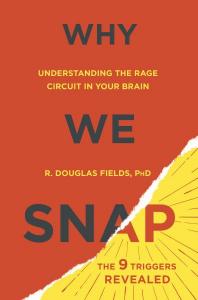R. Douglas Fields: Why We Snap
UNDERSTANDING THE RAGE CIRCUIT IN YOUR BRAIN
R. Douglas Fields, PhD
Dutton, January 12, 2016, $28
ISBN-10: 052595483X
ISBN-13: 978-0525954835
Fields reports:
Inspiration came in a flash. I was robbed. To my surprise, I reacted instantly by fighting back. I did get my wallet back in a violent struggle, but I was lucky. Had I thought about it, I never would have responded that way. Why did I do that, I wondered immediately afterward, and how?
Sudden aggressive behavior is familiar to everyone. If we experience road rage or smash a dish in anger, we are left baffled by witnessing our aggressive actions explode without conscious control. Sometimes we are stunned by regret. “I shouldn’t have said or done that.” Aggressive snap reaction is essential in dangerous professions and sports. It also is the neurocircuitry of heroism. “I didn’t think,” heroes utter in bewilderment, after having risked their life in an instant to rescue another person from sudden danger.
Exploring this process is central to my research in my day job as a neuroscientist at the National Institutes of Health. My encounter with the robber would not have sparked a book, however, had I not attended the cocktail reception at the NASW annual meeting in New Haven in 2010. Screaming over the din of the crowded reception, I recounted my recent harrowing experience to science writer John Rennie. “That’s your next book,” Rennie exclaimed.Starting to brainstorm from that moment, I scribbled notes that became the outline for this book on my entire train ride home. The ensuing four-year quest to flesh out the details led me not only into laboratories around the world to learn the latest neuroscience research on threat detection and sudden aggression, but also into the field. I met a wide range of extraordinary people, including race car drivers, secret service agents, members of SEAL team 6, elite athletes, relatives of the Boston Bombers, and members of religious groups who eschew violence and anger under any circumstance.
Had I shared a beer that night with someone else in that crowded room, this book might never have happened.
The Stuart Agency, which also sold my first book, The Other Brain, published in 2009, handled the sale. The book went to auction, and Dutton won the contract. I had a great editor at Dutton, Stephen Morrow.
Contact info:
• Douglas Fields: 301-480-3209, rdouglasfields@nasw.org
• Agent: Andrew Stuart, 212-586-2711, Andrew@stuartagency.com
• Publicist: Liza Cassity, 212-366-2554, Lcassity@prh.com
• Book website and blog: http://rdouglasfields.com
NASW members: will your book be published before March 31? Take advantage of this opportunity for shameless self-promotion. Submit your report for Advance Copy. The deadline for inclusion in the Spring issue of ScienceWriters is January 27.
Tell your fellow NASW members how you came up with the idea for your book, developed a proposal, found an agent and publisher, funded and conducted research, and put the book together. Include what you wish you had known before you began working on your book, or had done differently.
See https://www.nasw.org/advance-copy-submission-guidelines.
Thinking of writing a book? If you are a NASW member, you may access a list of more than 150 books and online resources to help you craft your book proposal, find an agent and funding sources, negotiate your contract, learn about self-publishing, publicize and market your book, and more at https://www.nasw.org/article/write-book.
Send book info and questions about book publishing to Lynne Lamberg, NASW book editor, llamberg@nasw.org.


